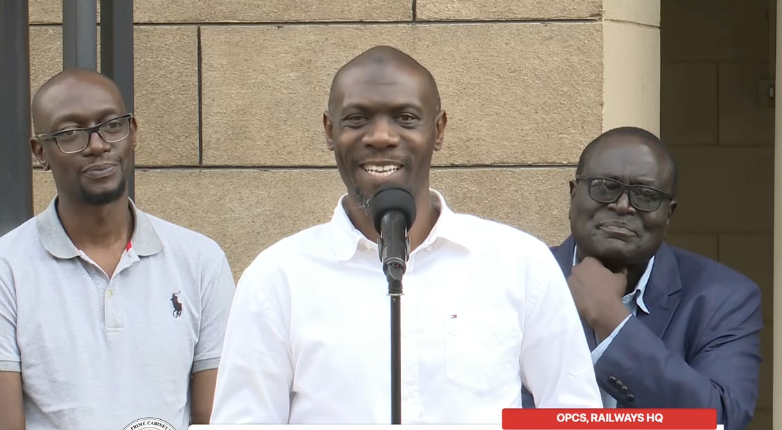
 Stephen Munyakho speaking during a reception hosted by Prime Cabinet Secretary and Foreign Affairs Cabinet Secretary Musalia Mudavadi at Railways Headquarters, July 30, 2025.
Stephen Munyakho speaking during a reception hosted by Prime Cabinet Secretary and Foreign Affairs Cabinet Secretary Musalia Mudavadi at Railways Headquarters, July 30, 2025.Stephen Munyakho, the Kenyan man who spent over a decade on death row in Saudi Arabia, has expressed deep gratitude to Kenyans for their unwavering support as he fought to avoid execution.
Munyakho returned to Kenya on the morning of Tuesday, July 29, marking the end of a 14-year ordeal that began with his arrest in 2011 and eventual conviction for murder.
Speaking during a reception hosted by Prime Cabinet Secretary and Foreign Affairs Cabinet Secretary Musalia Mudavadi at Railways Headquarters, Munyakho said the moment felt surreal.
“Words cannot express it,” he said, reflecting on his newfound freedom.
He extended heartfelt thanks to everyone who stood by him through the “Bring Back Stevo” campaign.
“Your prayers (and) contributions never went unnoticed. I feel indebted and don’t know how I can ever pay back—just accept my humble thanks.”
Munyakho had been working as a warehouse manager at a Red Sea tourist resort when a fatal altercation occurred with a Yemeni colleague in April 2011.
He was reportedly stabbed first and retaliated using the same weapon.
The colleague later died in hospital, leading to Munyakho’s initial conviction for manslaughter and a five-year sentence.
However, after the victim’s family appealed, a Sharia court escalated the charge to murder, which under Saudi law carried a death sentence by beheading.
His execution remained a looming threat for years, as the victim’s family demanded diyya—blood money—before granting pardon.
Relief finally came in early 2025 when the Muslim World League agreed to pay the full amount of approximately Sh130 million (about $1 million).
Following the settlement, Munyakho was released from Shimeisi Prison in Mecca on July 22.
He was issued an emergency travel document and deported to Kenya at the cost of Saudi authorities.
During the reception, Mudavadi assured the public that the government continues to work behind the scenes to assist Kenyans facing legal challenges abroad.
He revealed that close to 1,000 Kenyans are currently in conflict with the law in various countries.
“These are Kenyans in many different countries and we could only give you the numbers because we also have to respect the privacy of these individuals and their families,” he said.
“Our role is to be supportive in trying to facilitate humane treatment (and) possible release.”
Mudavadi also pushed back against claims that the government had abandoned its citizens abroad, referencing recent concerns about alleged abductions and torture of Kenyan activists in Tanzania.
“We work, we communicate, we follow diplomatic channels and we are doing it every day—it’s part of our remit. So it’s not factual when someone says that the Kenyan government has abandoned its citizens. That’s not true.”















